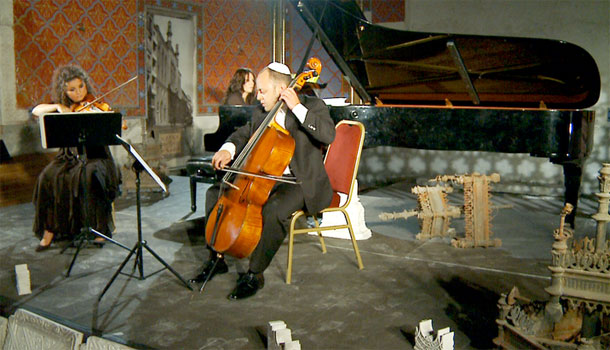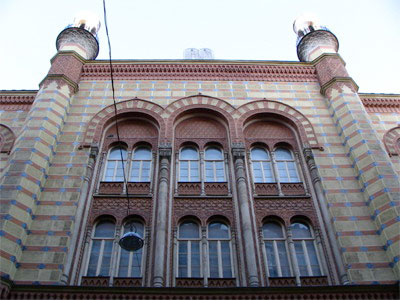
How does it feel to play Jewish classical music back in Eastern Europe, where it was composed? Performing in the Rumbach Synagogue in Budapest, with the dome and much of the lattice work far above our heads restored to their former beauty but with the tattered door to the ark and other stone frontispieces littering the side walls, and knowing as I played Leo Zeitlin’s Eli Zion or the heartbreaking slow movement of the Shostakovich trio (which is a conscious monument by its composer to these victims) that I was truly communing with those lost spirits, is a feeling I will cherish forever. I only hope that I will be able to repeat it and to see the day when the Rumbach Synagogue is once again a living and vibrant house of worship.

Source: greatsynagogue.hu
My dear friends from that neighborhood, Orsi (my violinist colleague and Juilliard classmate) and her husband Gergely (a horn player, artistic administrator of the Vienna Symphony, and a “Singer” turned “Sugar” around the turn of the century), have opened to me a new world—one which a comfortable American growing up in suburban Jewish Philadelphia had never known; one where, for example, the day before the concert, I stood in line at a famous Yiddish bakery, Noe, alongside a Lubavitcher, and was served a homemade flodni (a famous Hungarian Jewish cake—to die for!) by a man about my age who is married to the daughter of the chief rabbi of the great Dohány Street Synagogue, where my friends belong.It’s hard to find these kinds of experiences outside these still simmering embers of the formerly rich Jewish cultural life of Eastern Europe, but there’s a palpable feeling in the air when I visit, as though I’m with people who truly understand me, despite in many cases a total language barrier.
Jason Calloway is a cellist who was previously a member of the Naumburg Award-winning Biava Quartet, with whom he appeared on the inaugural concert of Pro Musica Hebraica. Calloway is currently cellist of the Amernet String Quartet, Ensemble-in-Residence at Florida International University. He is also cellist and artistic director of the ensemble, Shir Ami – Song of Our People, which is devoted to recovering and rejuvenating the rich musical heritage of the Jewish diaspora, and among whose most recent performances have been those at the City Temple in Vienna—the first concert ever held in this synagogue, the only one in Vienna to survive the terrors of Kristallnacht—and an appearance at the Budapest Summer Jewish Festival last year, as described in this blog entry. Shir Ami will appear at Strathmore in North Bethesda on January 22, in a varied program of works from the Jewish diaspora. For more information or to purchase tickets, click here.